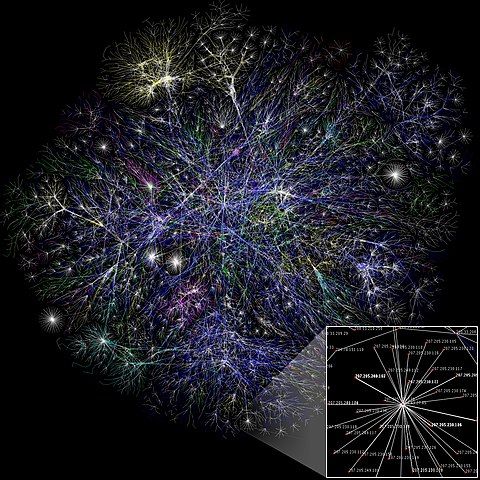Internet enables Collective Intelligence at Planetary Scale
Collective Intelligence
Collective intelligence is a theory that describes a type of shared or group intelligence that emerges from the collaboration and competition of many individuals and appears in consensus decision making in bacteria, animals, and computer networks.
The advancement in communication technology has prompted the rise of global companies at low overhead costs. The internet is widespread, therefore a globally integrated company has no geographical boundaries and may access new markets, ideas and technology.

Shared Intelligence Space
A group of users marshal resources to create an ecology that meets their needs often (but not only) in relation to the co-configuration, co-creation and co-design of a particular learning space that allows learners to create their own context. Learner generated contexts represent an ad hoc community that facilitates coordination of collective action in a network of trust. An example of Learner generated context is found on the Internet when collaborative users pool knowledge in a “shared intelligence space” such as Wikipedia. As the Internet has developed so has the concept of CI as a shared public forum. The global accessibility and availability of the Internet has allowed more people than ever to contribute and access ideas.
Specialized information site such as Digital Photography Review or Camera Labs is an example of collective intelligence. Anyone who has an access to the internet can contribute to distributing their knowledge over the world through the specialized information sites.
New media
New media are often associated with the promotion and enhancement of collective intelligence. The ability of new media to easily store and retrieve information, predominantly through databases and the Internet, allows for it to be shared without difficulty. Thus, through interaction with new media, knowledge easily passes between sources resulting in a form of collective intelligence. The use of interactive new media, particularly the internet, promotes online interaction and this distribution of knowledge between users.

The Emergence of a Global Brain
Francis Heylighen, Valentin Turchin, and Gottfried Mayer-Kress are among those who view collective intelligence through the lens of computer science and cybernetics. In their view, the Internet enables collective intelligence at the widest, planetary scale, thus facilitating the emergence of a Global brain. The developer of the World Wide Web, Tim Berners-Lee, aimed to promote sharing and publishing of information globally. Later his employer opened up the technology for free use. In the early ‘90s, the Internet’s potential was still untapped, until the mid 1990s when ‘critical mass’, as termed by the head of the Advanced Research Project Agency (ARPA), Dr. J.C.R. Licklider, demanded more accessibility and utility. The driving force of this form of collective intelligence is the digitization of information and communication. Henry Jenkins, a key theorist of new media and media convergence draws on the theory that collective intelligence can be attributed to media convergence and participatory culture. Collective intelligence is not merely a quantitative contribution of information from all cultures, it is also qualitative.
With the development of the Internet and its widespread use, the opportunity to contribute to community-based knowledge forums, such as Wikipedia, is greater than ever before. These computer networks give participating users the opportunity to store and to retrieve knowledge through the collective access to these databases and allow them to “harness the hive” (Raymond 1998; Herz 2005 in Flew 2008). Researchers at the MIT Center for Collective Intelligence research and explore collective intelligence of groups of people and computers.
In this context collective intelligence is often confused with shared knowledge. The former is knowledge that is generally available to all members of a community while the latter is information known by all members of a community. Collective intelligence as represented by Web 2.0 has less user engagement than collaborative intelligence.
See also: